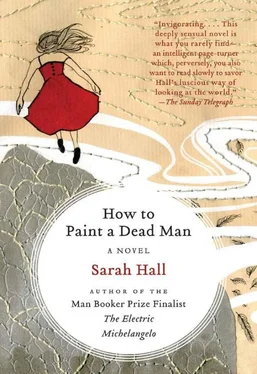Sarah Hall - How to Paint a Dead Man
Здесь есть возможность читать онлайн «Sarah Hall - How to Paint a Dead Man» весь текст электронной книги совершенно бесплатно (целиком полную версию без сокращений). В некоторых случаях можно слушать аудио, скачать через торрент в формате fb2 и присутствует краткое содержание. Год выпуска: 2009, Издательство: Harper Perennial, Жанр: Современная проза, на английском языке. Описание произведения, (предисловие) а так же отзывы посетителей доступны на портале библиотеки ЛибКат.
- Название:How to Paint a Dead Man
- Автор:
- Издательство:Harper Perennial
- Жанр:
- Год:2009
- ISBN:нет данных
- Рейтинг книги:4 / 5. Голосов: 1
-
Избранное:Добавить в избранное
- Отзывы:
-
Ваша оценка:
- 80
- 1
- 2
- 3
- 4
- 5
How to Paint a Dead Man: краткое содержание, описание и аннотация
Предлагаем к чтению аннотацию, описание, краткое содержание или предисловие (зависит от того, что написал сам автор книги «How to Paint a Dead Man»). Если вы не нашли необходимую информацию о книге — напишите в комментариях, мы постараемся отыскать её.
, Sarah Hall, "one of the most significant and exciting of Britain's young novelists" (
), delivers "a maddeningly enticing read... an amazing feat of literary engineering" (
).
How to Paint a Dead Man — читать онлайн бесплатно полную книгу (весь текст) целиком
Ниже представлен текст книги, разбитый по страницам. Система сохранения места последней прочитанной страницы, позволяет с удобством читать онлайн бесплатно книгу «How to Paint a Dead Man», без необходимости каждый раз заново искать на чём Вы остановились. Поставьте закладку, и сможете в любой момент перейти на страницу, на которой закончили чтение.
Интервал:
Закладка:
Annette wonders if her mother will ever recover from such loss. She still wears the long black dresses that cover her ankles and fall in a gather, like a curate’s hood, at the shoulders. She communicates feverishly with God about her past misfortune, and finds no joy in living. Uncle Marcello says it is a shame for such a young woman to continue to wear such dresses. That she wears them to hide herself.
Annette’s mother’s eyes are only a little short-sighted. She does not wear glasses, not even on the fine chain around her neck, but she has seen things. She has seen that there are great oceans of darkness in which her daughter might be swept away. There are daily assaults her daughter might encounter. An avalanche of aubergines rolling towards her in the market, or a hole in the pavement with Southerners inside, or a lascivious kiss from a stranger. She will not tolerate her daughter’s curiosity about these subjects. ‘Enough of this inquisition!’ she cries, when Annette asks how the aubergines would get loose, or why the hole has not been filled by street workers, or when she asks whether the Bestia can climb from the heavy gilt frame and move unnoticed through the street, and whether he wears the crimson wattle of a cockerel, or has sallow haunted eyes like the wolf of Saint Francis. ‘Just promise me you will be vigilant and good. That is all I ask!’
Annette promises, and tries to do her best. But if she brings home fish with fingermarks on the scales her mother will always notice. ‘You should be more careful not to grope at things,’ she says. ‘It gives you away.’ When Mauri dances with Annette in the courtyard holding her hips and swaying her like a bell, she will rap on the window, or fling it open, and say, ‘How many more times must I tell you.’ When she suffers headaches the whole house must muffle itself, and tiptoe and whisper. Annette must go to the cupboard in the kitchen and find the tin of camomile flowers with which to make an infusion. She must soak a cotton napkin in the grassy tonic while her mother lies on the crocheted cover of her bed. She drapes the towel over her mother’s forehead and presses it gently. She hears her mother weeping. ‘I am so tired,’ she whispers. ‘I have been left alone with too many reminders. Other mothers have daughters who are able to help them. Other women have husbands who fell poplars for their daughter’s wedding. What hope is there?’
‘Let me help more,’ Annette suggests, stirring the bowl of dusty yellow flowers and floating stalks. ‘I know where the flour is kept, and the eggs.’ But her mother continues to weep; she is inconsolable. ‘It’s OK. Leave me alone now. Go to mass. Take flowers to Papa’s grave and tell him we miss him.’
Before her vision deteriorated completely, Annette would look at her mother sitting at the dresser, anointing herself with oils. She would watch her brushing her hair and smoothing her eyebrows, plucking them in the centre so they became separate, and she would think her most beautiful. Before the final sickness, the blizzard that descended from nowhere and severed the nerves, there were still tunnels of sight. She could move her head around and find the cameo of this sombre, elegant woman. At the table when they sat for meals, if she looked up and to the right, she could see her mother’s crucifix, lying in the milky hollow of her breasts. The sunlight would glimmer and flash against it, like a match flaring inside Annette’s head. ‘It makes you seem simple,’ her mother commented, ‘when you dip and tip your head like that. Are things getting worse, Annette? Should we go back to the doctor and see if he can provide some dark glasses?’ ‘Yeah. Then she can sing the Blues,’ said Mauri.
When she was ten years old, warm drops were sprinkled into her eyes from a pipette every night. Annette imagined that the solution melted the frost creeping around her pupils, like the ice on the windowpanes of Castrabecco in winter. She would stay very still while her mother held her chin and administered the prescription, trying not to blink just at the moment the splash landed on each eye. She always did blink and her lashes would squeeze out the fluid and it would trickle over her cheeks. And they would try again, Annette looking up, her neck stretched long and her eyes wide, like a baby bird.
Even when she could still see, there were days Annette felt unsure of the things surrounding her. The edges wobbled and warped. Sometimes she could not capture an image by moving her head around and she would require verification. ‘Am I wearing a blue coat today?’ she would ask her mother. ‘Is that a cat sleeping on the roof? Is it Mauri walking across the gardens with Uncle Marcello? Is Tommaso doing a handstand against the wall?’ ‘Yes, yes, yes!’ her mother would snap. Or, if she had a headache and was tired and angry, ‘No, Annette,’ she would say, ‘that is a dead thing, which you should be grateful you cannot see.’ Or, ‘That is a wicked sinful thing, please look away.’ Or, ‘That is the Bestia, quickly, walk on.’ And Annette would cover her face and mewl like a lost kitten as they hurried down the street.
But at school, when Signor Giorgio came to instruct the class on drafting and colouring, he told her that her paintings of flowers were in fact very good. They were small miracles that contained absolutely the soul of the still-life, he said. He told her that her name was French, and that there was a great French painter who slowly lost his sight, but that because of this he was able to create works of subtlety and innovation. Annette liked that Signor Giorgio wore heavy medical spectacles too, like the spectacles she had been issued by Dottor Florio. Whenever he entered the classroom he would smile at her, and pinch the arms of his spectacles between his fingers, as if he were saying, look, today we are both wearing our ridiculous contraptions. He did not mind if she moved her head around in arcs and circles until she could locate the object they were drawing, or the blue suspenders lying against his shirt, or his white hair. He smelled of smoke, like a bonfire in autumn, and he was wise and kind. ‘Remember,’ he told her, ‘when there is no more hope, we shall each of us see by our mind’s eye.’
The Mirror Crisis
If you didn’t live in London you could probably survive on your income from self-employment alone. Enough projects come your way, you’ve established yourself as a bright new talent in the field, and there are loyal galleries. But this is a city of financial haemophilia. Rent, mortgages, Oyster cards, gas, electricity, recreation, food; it costs, even to breathe. You know only a few artists who can subsist independently. It is simply the way of it here-writers teach or moonlight as journalists, painters take civic commissions, sound engineers work in advertising, actresses pull pints and make bad receptionists.
You like your other job. You like Borwood House. It’s not the best set-up for exhibitions, hasn’t the natural light or the dimensions of the Soane or the Tate Modern, but its proportions are decent and it has character — a late-Victorian town house with high ceilings, stained glass, and dado rails intact. You helped set the place up. Angela, your oldest university friend, organised the conversion with an unlikely bank loan and some family money. She wanted you in on it and pitched it in a way that sounded exciting and feasible. It will be a different kind of production space, she said. Imagine it. A little Left Bank. Licensed. Quirky. Eight pounds entry with a glass of wine maybe — it’s competitive, it’ll work. Come on, Suze, she said, we won’t have to fanny about with P45s any more. It’s stupid not to get a bit of security at our age. You weren’t sure she would be able to pull it off, all the advertising, the security systems, and the introductions into the notoriously elite art circuit. But her powers of facilitation were surprising. The gallery’s reputation grew, the number of visitors increasing each year. There has been Arts Council funding. Borwood has recently hosted the drawings of Schiele and Goya. It’s the real deal.
Читать дальшеИнтервал:
Закладка:
Похожие книги на «How to Paint a Dead Man»
Представляем Вашему вниманию похожие книги на «How to Paint a Dead Man» списком для выбора. Мы отобрали схожую по названию и смыслу литературу в надежде предоставить читателям больше вариантов отыскать новые, интересные, ещё непрочитанные произведения.
Обсуждение, отзывы о книге «How to Paint a Dead Man» и просто собственные мнения читателей. Оставьте ваши комментарии, напишите, что Вы думаете о произведении, его смысле или главных героях. Укажите что конкретно понравилось, а что нет, и почему Вы так считаете.












